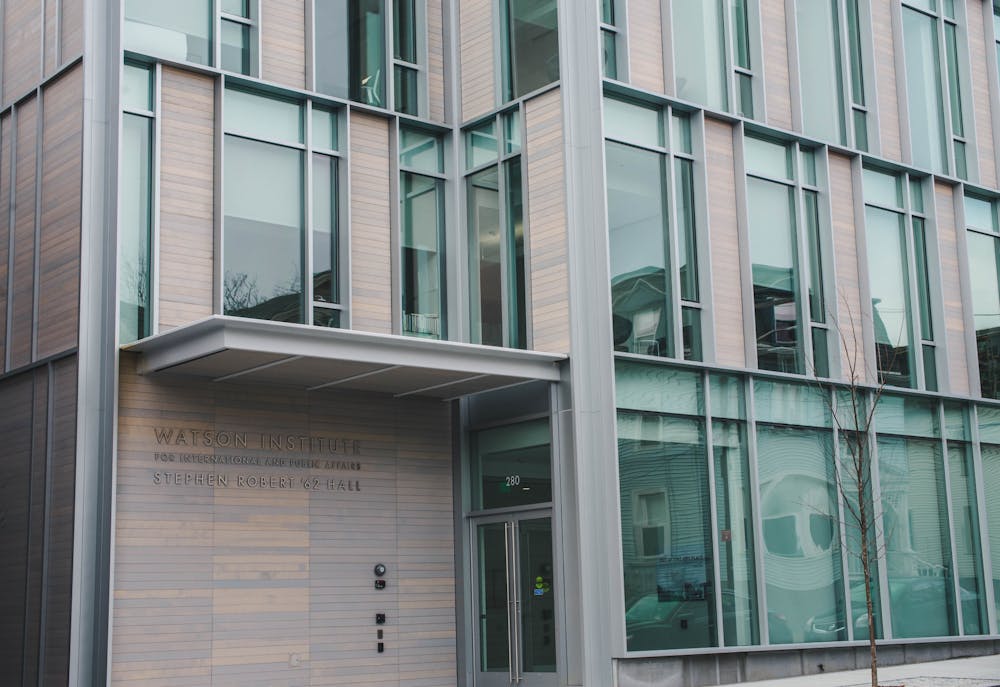Ana Navarro, a Republican political analyst and commentator who co-hosts ABC’s “The View” and frequently appears on CNN and Telemundo, spoke with Director of the Taubman Center for American Politics and Policy and Professor of Political Science Wendy Schiller at the Taubman Institute’s annual Alexander Meiklejohn Lecture March 10. Throughout the conversation, Navarro discussed her personal political beliefs and opinions on current events.
Navarro attracted attention in 2016 for maintaining a resolutely anti-Trump position as most Republicans embraced his ascension to the presidency. She remains solidly anti-Trump, a position she attributes to his politics and personality.
“I don’t think he represents the principles of the Republican Party that I grew up with,” Navarro said, noting that his comments about women and his mocking of a person with disabilities were particularly influential in turning her away from Trump. “Having the moral character and fitness to serve in the highest office in the land, to me, counts more than whether there’s an ‘R’ or a ‘D’ in front of your name,” she added.
Navarro’s decision to adopt a position that conflicted with her party had consequences, she said, jokingly referring to her decision to remain a Republican as “a masochism issue.”
“I ask myself why I’m still a Republican. I think having two functioning parties offering solutions, competing for our vote, earning our support, is so very important,” she said. “I’m a creature of habit, and I hate the idea of being pushed out of the party that I’ve been a member of for my entire life by Donald Trump.”
Navarro also spoke about the Russian invasion of Ukraine and how the Russian government has successfully exacerbated American political divisions in recent years to sow discord about the war.
In her eyes, while comments such as Prince William’s — who said that people are used to seeing conflict in Asia and Africa but that it was “very alien to see this in Europe” — are repugnant, giving these comments media attention only distracts from the war itself.
“Should we be focusing on what some prince in England stupidly said? And how is that going to help one Ukrainian refugee?” Navarro asked, affirming that it is in Russia’s best interest to highlight comments such as these.
When asked how long she thinks Americans will tolerate the economic consequences of imposing sanctions on Russia, Navarro said, “The minute … (when) everybody picks up their tent and pitches it elsewhere because there’s a bigger story somewhere … you’ll see action wane.”
“The harsh, sad, real truth is that we have a limited attention span in this country. And if we’re not seeing it, hearing it, feeling it — if it’s not tugging at our hearts — it’s out of sight, out of mind,” she added.
As a Floridian and a Nicaraguan — she fled the country with her family when she was a child — Navarro spoke at length about the growing shift among Latino voters to the Republican Party. In the 2020 election, Trump made significant gains with Latino voters in some counties, according to data reported by FiveThirtyEight. Democrats, Navarro believes, have made the mistake of taking the Latino vote for granted.
“There’s no groupthink in the Latino community … you don’t leave (courting Latino voters) for the last minute; you don’t leave it for the last eight weeks of the election,” she said. This feeling of being taken for granted, she said, combined with the increasing ability of Republicans to portray their opponents as radicals, is spurring political realignment among some Latinos.
“There’s been a huge loss of support in places like the district where (my family) lived … because there was a steady drumbeat from Republicans portraying Democrats — any Democrat, every Democrat — as socialist.”
Navarro emphasized that she doesn’t shy from disagreement, calling political diversity “fun,” “exciting” and “enriching.”
“One of the problems we have in America is the lack of diversity of thought,” she said. “It’d be so boring to be with people who were just one homogeneous blob.”
Charlie Clynes was the managing editor of digital content on The Herald's 134th Editorial Board. Previously, he covered University Hall and the Graduate Labor Organization as a University News editor.





